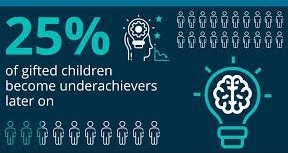It is easy to misunderstand a child who is both learning disabled and gifted. Mentally retarded, or “slow,” are the labels often mistakenly given to persons with learning disabilities. Because of these misconceptions, a child who is gifted and who is also learning disabled often experiences a very challenging life. Academically, the child may perform poorly, but more important is the potentially damaging psychological impact of being perceived by others as “dumb” or mentally deficient, despite possessing the unlocked abilities and potential to excel. The self-confidence required for dealing with these issues and progressing past them can be achieved through success with a tutor.
Intellectual giftedness is exceptional in its own right–this is what many experts fail to realize. Social deprivation and poor classroom performance are just a couple of the problems that are experienced by both gifted children and those with mental retardation. Also, similar problems can be caused by a learning disability. There are particularly tricky challenges if a child is learning disabled but otherwise gifted.
A lot of times, gifted children who have learning difficulties have problems in school. Their learning disability can lead to a decrease in motivation as well as difficulty in completing classroom tasks which may, as a result, mask their true potential. But in other endeavors, such as music or dance, the child may be highly creative and intelligent. An undiagnosed learning problem may also lead to the opposite problem: an otherwise gifted child may struggle in school due to the presence of a learning disability not yet diagnosed.
Parents must become knowledgeable about the signs of various learning disabilities and of being gifted. There may be a huge gap between test results (measuring academic potential) and actual academic performance for a gifted child with a learning disability. It’s also possible for such children to display impressive creative intelligence, that manifests itself only at home and not in the grades they receive at school. Behavior problems, or “acting out,” is not uncommon among children with learning disabilities, especially when frustration builds. If your child is displaying these characteristic features, you may wish to have your child evaluated for the presence of a learning disability.
Learning disability tests can be administered by school officials with ease. Inevitably, smart children with learning disabilities fall through the cracks in public schools; there isn’t enough attention to help everyone. If a parent or the child himself feels that they need to be tested for a learning disability, the parent must become the child’s advocate. Any student has the right to take a learning disability test; this right to test for suspected learning disabilities is protected by the Americans with Disabilities Act. First talk with your child’s teacher and if you find that you are not getting anywhere, it is essential to go to the school’s officials.
A number of options exist for children that are diagnosed as gifted and learning disabled. A gifted child might need extra resources; a really gifted child may need to skip a grade or more. Opportunities for cultural field trips and art classes, to aid in experiential (not just instructional) learning, should be regularly offered. Alternative information presentation, special classes, or technological aids each help with some learning disabilities.
Studies have concluded that the optimum environment for children who are gifted and have a learning disability is one that accepts differences and provides help with the learning disability; further, it is still extremely important that they be challenged regularly. A tutor who can work one-on-one can use this learning environment to attain more successful results. In addition, these children should be offered every chance to put forth their own preferences and desires. Their intelligence will help considerably; they can understand the implications of their learning disability and thus better cope with it. Children who are gifted and learning disabled, with the correct interventions in place, have a fantastic chance of becoming successful adults. After it is determined what the diagnosis is, the parents and child can then begin to learn how best to cope with it. The child needs not only support for the learning disability, but an environment that gives him or her challenges and stimulation.
Children who are gifted and learning disabled have an excellent chance to become successful adults. Once the learning disability is diagnosed, coping strategies can be integrated into the child’s life. It is important to provide the child with a stimulating, intellectually challenging environment that includes support for the learning disability.



(2) Comments